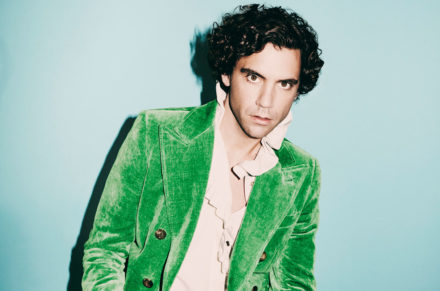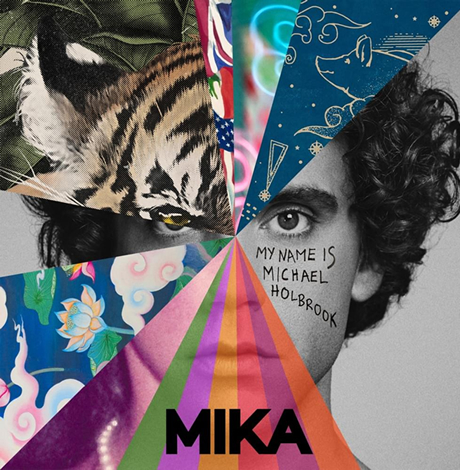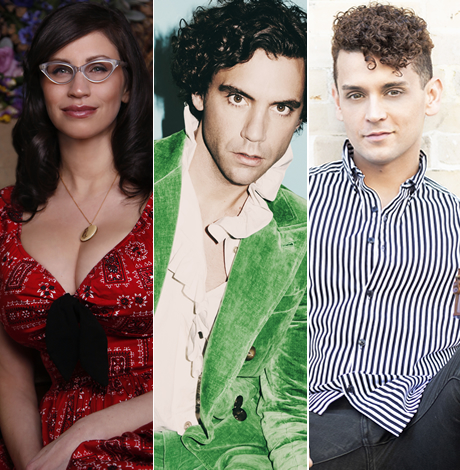Arts & Entertainment
Stripped-down Mika
Out singer brings three-man combo for D.C. tour stop
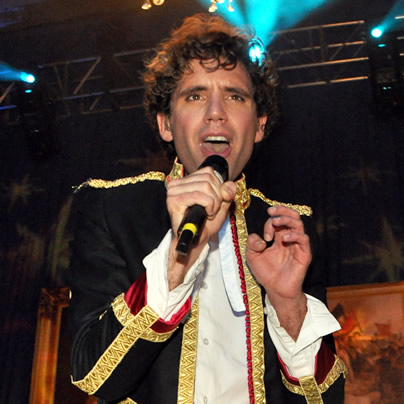
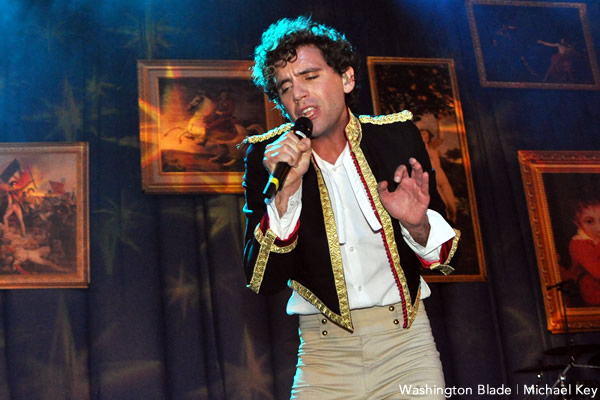
Mika returns to Washington next week. His show at the Historic Sixth & I Synagogue is sold out. (Washington Blade file photo by Michael Key)
Mika
Wednesday, 8 p.m.
Sixth & I Synagogue
600 I St., N.W.
SOLD OUT
Sixthandi.org
Bit.ly/mikaofficial
Gay pop singer Mika was in Vancouver when we spoke by phone two weeks ago. He was in tour rehearsals for a stripped-down 17-date mini tour behind his latest album “The Origin of Love,” which dropped in October.
There’s good news and bad — he is coming to Washington but the show is sold out. He’s slated to be here Wednesday night for a show at the Historic Sixth & I Synagogue. A review of his March 27 show at Los Angeles’s El Rey Theatre drew raves. A blogger (Neon Tommy) said he spent much of the evening at the piano and, “as great as his voice may sound in recordings, it is unbelievably smooth live” and “beyond impressive.”
WASHINGTON BLADE: What kind of instrumentation will you bring?
MIKA: There are three of us playing everything from piano to clarinet to sax to accordion to marimba to vibraphone — we have all these different instruments being played and we’re trying almost to make it sound classically influenced almost. We’ve done some scoring on a lot of this stuff just for this tour.
BLADE: How do you take highly produced dance pop and make it work with that kind of instrumentation?
MIKA: You take it back to the way it was written, to its most essential things. Things start out very basically, like maybe just piano and bass, and then build and build until you get the more dance stuff. But there’s loads of different ways to do it. It almost sounds more tribal on stage. It’s kind of like you’re getting people up and dancing and singing without all the bleeps and blowups.
BLADE: Is this where you are musically now or is it just a way to contrast it with the touring you did last fall?
MIKA: It definitely will affect the sound of my next record. We’re testing new songs and it’s already happening. The new stuff is a lot more sparse.
BLADE: The transition in your vocals from your natural range into falsetto is so seamless. With many singers it’s so much more pronounced. Was that just always the way it was or have you worked to develop and refine that?
MIKA: It’s really the result of growing up being trained by Russian classical musicians. It was like really serious professional singing. I can flip really effortlessly because I’ve been doing it since I was about 11. At the same time, my full voice range is actually quite limited. I’m technically a baritone, so pop just doesn’t work for that kind of voice and I had to develop a way to have more range. If you listen to Freddie Mercury or Prince, you see how we try to stretch it as far as you can and make it so it’s almost unnoticeable.
BLADE: Now that you’ve been out a while, what differences have you noticed career-wise?
MIKA: There’s been no change whatsoever in the people coming to the shows. It’s exactly the same demographics … I have always had this very crazy mix. Press wise, people talk about it, but it’s only one question that comes and goes because I’ve never lied or pretended to be anything I wasn’t. I refused to label myself. And the music hasn’t changed. Beyond that, I think there’s definitely a different sort of person now who comes up and talks to me on the street. That happens in a very different way. I think it’s made me slightly more approachable to some people.
BLADE: Are you in a relationship now?
MIKA: Yes I am but it’s hard. Beyond the traveling, this desire to constantly be creating … I think takes its toll on a relationship. … Relationships are about stability and that isn’t necessarily the most conducive thing to the creative process.
BLADE: You have such great hair — any tips?
MIKA: Wow, relationships to hair — that’s quite a change.
BLADE: Well, I’m trying to move fast.
MIKA: The hair thing, I don’t know. I hate washing it. I feel like you lose a bit of your brain or something every time you wash it.
BLADE: How often do you wash it?
MIKA: Maybe like once a week or something. It’s kind of skanky.
BLADE: How easily do the hooks come? Is there a large discard pile of songs that just aren’t hooky enough or can you make the hooks tighter as you write and tweak?
MIKA? With the last record I think I wrote 16 or 17 songs and I put out 15 so no, there’s not a lot of waste. It’s a very efficient writing process. I try to write like a child, to write as someone who’s allowing himself to be a child. I don’t really chase hooks, but I try to capture that feeling of being an 8- or 9-year-old girl or boy on a holiday. … I’m obsessed with the craft of thrill building.
Books
Love or fear flying you’ll devour ‘Why Fly’
New book chronicles a lifetime obsession with aircraft

‘Why Fly’
By Caroline Paul
c. 2026, Bloomsbury
$27.99/256 pages
Tray table folded up.
Check. Your seat is in the upright position, the airflow above your head is just the way you like it, and you’re ready to go. The flight crew is making final preparations. The lights are off and the plane is backing up. All you need now is “Why Fly” by Caroline Paul, and buckle up.

When she was very young, Paul was “obsessed” with tales of adventure, devouring accounts written by men of their derring-do. The only female adventure-seeker she knew about then was Amelia Earhart; later, she learned of other adventuresome women, including aviatrix Bessie Coleman, and Paul was transfixed.
Time passed; Paul grew up to create a life of adventure all her own.
Then, the year her marriage started to fracture, she switched her obsession from general exploits to flight.
Specifically, Paul loves experimental aircraft, some of which, like her “trike,” can be made from a kit at home. Others, like Woodstock, her beloved yellow gyrocopter, are major purchases that operate under different FAA rules. All flying has rules, she says, even if it seems like it should be as freewheeling as the birds it mimics.
She loves the pre-flight checklist, which is pure anticipation as well as a series of safety measures; if only a relationship had the same ritual. Paul loves her hangar, as a place of comfort and for flight in all senses of the word. She enjoys thinking about historic tales of flying, going back before the Wright Brothers, and including a man who went aloft on a lawn chair via helium-filled weather balloons.
The mere idea that she can fly any time is like a gift to Paul.
She knows a lot of people are terrified of flying, but it’s near totally safe: generally, there’s a one in almost 14 million chance of perishing in a commercial airline disaster – although, to Paul’s embarrassment and her dismay, it’s possible that both the smallest planes and the grandest loves might crash.
If you’re a fan of flying, you know what to do here. If you fear it, pry your fingernails off the armrests, take a deep breath, and head to the shelves. “Why Fly” might help you change your mind.
It’s not just that author Caroline Paul enjoys being airborne, and she tells you. It’s not that she’s honest in her explanations of being in love and being aloft. It’s the meditative aura you’ll get as you’re reading this book that makes it so appealing, despite the sometimes technical information that may flummox you between the Zen-ness. It’s not overwhelming; it mixes well with the history Paul includes, biographies, the science, heartbreak, and exciting tales of adventure and risk, but it’s there. Readers and romantics who love the outdoors, can’t resist a good mountain, and crave activity won’t mind it, though, not at all.
If you own a plane – or want to – you’ll want this book, too. It’s a great waiting-at-the-airport tale, or a tuck-in-your-suitcase-for-later read. Find “Why Fly” and you’ll see that it’s an upright kind of book.
The Blade may receive commissions from qualifying purchases made via this post.
Theater
Out actor Kevin Cahoon on starring role in ‘Chez Joey’
Arena production adapted from Broadway classic ‘Pal Joey’

‘Chez Joey’
Through March 15
Arena Stage
1101 Sixth St., S.W.
Tickets start at $93
Arenastage.org
As Melvin Snyder in the new musical “Chez Joey,” out actor Kevin Cahoon plays a showbiz society columnist who goes by the name Mrs. Knickerbocker. He functions as a sort of liaison between café society and Chicago’s Black jazz scene circa 1940s. It’s a fun part replete with varied insights, music, and dance.
“Chez Joey” is adapted from the Broadway classic “Pal Joey” by Richard Rodgers and Lorenz Hart. It’s inspired by John O’Hara’s stories based on the exploits of a small-time nightclub singer published in The New Yorker.
A warm and humorous man, Cahoon loves his work. At just six, he began his career as a rodeo clown in Houston. He won the Star Search teen division at 13 singing songs like “Some People” from “Gypsy.” He studied theater at New York University and soon after graduating set to work playing sidekicks and comedic roles.
Over the years, Cahoon has played numerous queer parts in stage productions including “Hedwig and the Angry Inch,” “La Cage aux Folles,” “Rocky Horror” as well as Peanut in “Shucked,” and George the keyboardist in “The Wedding Singer,” “a sort of unicorn of its time,” says Cahoon.
Co-directed by Tony Goldwyn and the great Savion Glover, “Chez Joey” is a terrific and fun show filled with loads of talent. Its relevant new book is by Richard Lagravenese.
On a recent Monday off from work, Cahoon shared some thoughts on past and current happenings.
WASHINGTON BLADE: Is there a through line from Kevin, the six-year-old rodeo clown, to who we see now at Arena Stage?
KEVIN CAHOON: Anytime I want to land a joke in a theater piece it goes back to that rodeo clown. It doesn’t matter if it’s Arena’s intimate Kreeger Theatre or the big rodeo at the huge Houston Astrodome.
I was in the middle stadium and there was an announcer — a scene partner really. And we were doing a back and forth in hopes of getting laughs. At that young age I was trying to understand what it takes to get laughs. It’s all about timing. Every line.
BLADE: Originally, your part in “Chez Joey” Melvin was Melba who sings “Zip,” a clever woman reporter’s song. It was sort of a star feature, where they could just pop in a star in the run of “Pal Joey.”
CAHOON: That’s right. And in former versions it was played by Martha Plimpton and before her Elaine Stritch. For “Chez Joey,” we switched gender and storyline.
We attempted to do “Zip” up until two days before we had an audience at Arena. Unexpectedly they cut “Zip” and replaced it with a fun number called “I Like to Recognize the Tune,” a song more connected to the story.
BLADE: Wow. You must be a quick study.
CAHOON: Well, we’re working with a great band.
BLADE: You’ve played a lot of queer parts. Any thoughts on queer representation?
CAHOON: Oh yes, definitely. And I’ve been very lucky that I’ve had the chance to portray these characters and introduce them to the rest of the world. I feel honored.
After originating Edna, the hyena on Broadway in “The Lion King,” I left that to do “Hedwig and the Angry Inch” as standby for John Cameron Mitchell, doing one show a week for him.
Everyone thought I was crazy to leave the biggest musical of our time with a personal contract and getting paid more money that I’d ever made to get $400 a week at the downtown Jane Street Theatre in a dicey neighborhood.
At the time, I really felt like I was with cool kids. I guess I was. And I never regretted it.
BLADE: When you play new parts, do you create new backstories for the role?
CAHOON: Every single time! For Melvin, I suggested a line about chorus boys on Lakeshore Drive.
BLADE: What’s up next for Kevin Cahoon?
CAHOON: I’m about to do the New York Theatre Workshop Gala; I’ve been doing it for nine years in a row. It’s a huge job. I’ll also be producing the “Cats: The Jellicle Ball” opening on Broadway this spring; it’s a queer-centric uptown vogue ball with gay actor André de Shields reprising his role as “Old Deuteronomy.”
BLADE: There’s a huge amount of talent onstage in “Chez Joey.”
CAHOON: There is. I’m sharing a dressing room with Myles Frost who plays Joey. He won accolades for playing Michael Jackson on Broadway. We’ve become great friends. He’s a miracle to watch on stage. And Awa [Sal Secka], a D.C. local, is great. Every night the audience falls head over heels for her. When this show goes to New York, Awa will, no doubt, be a giant star.
BLADE: Do you think “Chez Joey” might be Broadway bound?
CAHOON: I have a good feeling it is. I’ve done shows out of town that have high hopes and pedigree, but don’t necessarily make it. “Chez Joey” is a small production, it’s funny, and audiences seem to love it.

The Capital Pride Alliance held the annual Pride Reveal event at The Schuyler at The Hamilton Hotel on Thursday, Feb. 26. The theme for this year’s Capital Pride was announced: “Exist. Resist. Have the audacity!”
(Washington Blade photos by Michael Key)























-

 India4 days ago
India4 days agoActivists push for better counting of transgender Indians in 2026 Census
-

 Advice4 days ago
Advice4 days agoDry January has isolated me from my friends
-

 District of Columbia4 days ago
District of Columbia4 days agoCapital Pride reveals 2026 theme
-

 National4 days ago
National4 days agoAfter layoffs at Advocate, parent company acquires ‘Them’ from Conde Nast

